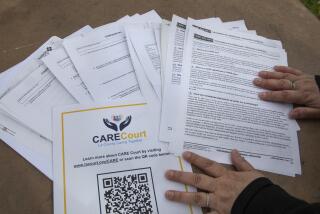Treatment of the Mentally Ill
Those mentally ill who are “lucky” enough to be taken to a mental hospital by the police when arrested, or transferred from jail, still may not receive psychiatric treatment, even though involuntarily confined, as the result of a law--Riese vs. St. Mary court decision--introduced to California in 1989. According to this decision, involuntary patients may not be given antipsychotic, antidepressant or anti-epileptic medication against their will. They have to sign a consent form and accept medication when offered to them by a nurse. Few severely ill, psychotic patients have the capacity to understand what all this means and have to be taken to court where the judge has to make a decision as to the competence of a patient to accept or refuse medication. Apart from the fact that the judge finds himself/herself in the unpleasant situation of making a medical decision, the onset of treatment of the patient is delayed by many days.
Taxpayers’ money is spent uselessly by keeping a patient in a locked ward at a cost of about $1,200 a day without the possibility of treating the patient. If, however, the Riese petition is not granted because the patient--though mentally ill--has the capacity to refuse treatment, the patient will be released untreated and often in worse condition into a community that has a right to be protected from a possibly dangerous mental patient; or the patient goes back to jail where he/she again is not treated and usually becomes more ill and is eventually released.
Some doctors in the already understaffed, overcrowded mental hospitals simply don’t have the time--without coverage--to spend day after day in court instead of on their wards. Confused, vulnerable, unstable patients should not be subjected to a complicated, to them incomprehensible, adversarial system in which a public defender fights both the district attorney and the doctor in a misunderstood attempt to “get the patient out of the hospital” and to save him/her from badly needed psychiatric treatments.
ELIZABETH M. SCHMID MD, Chatsworth


